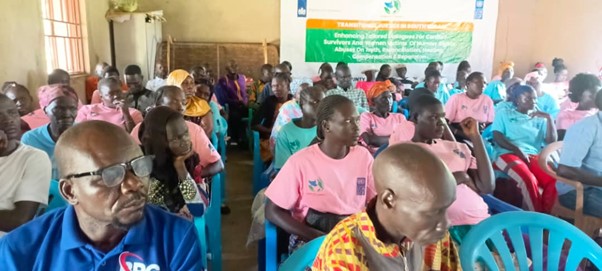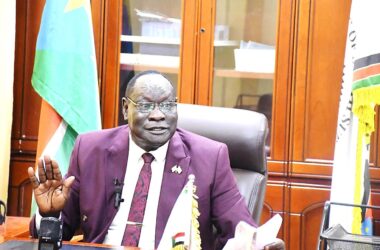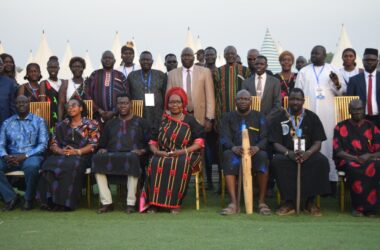By James Innocent
Women in Yei River County have appealed to men to end all forms of violence against women, citing that they have endured years of suffering caused by conflict, displacement, and social discrimination.
The call came during a community training organized by Vision for Humanity, focusing on transitional social justice, emotional healing, and reconciliation for survivors of the South Sudan conflict.
Charity Amude, one of the survivors, recalled the painful memories of war — including harassment, beatings, and the loss of property.
“We went through terrible moments — some of our loved ones were killed right before our eyes,” she said. “I call on our partners to continue offering us training and support so we can heal from the pain we carry.”
Amude expressed deep gratitude to humanitarian organizations such as Vision for Humanity for standing with women who survived sexual violence and other abuses. She noted that many women remain silent about rape due to fear of stigma, rejection by their families, and lack of trust in the justice system.
“Most women are afraid to report rape cases because they feel ashamed,” she said. “When they go to the police, some are blamed instead of protected, and in some cases their husbands abandon them.”
Earlier on during the first training Police Inspector General of Yei River County, Major General Ali Abdallah Tif, urged women to report gender-based violence and other criminal acts without fear, assuring the public that the police are committed to protecting all citizens.
“The police have a duty to protect people and their property, not to harm them,” he said. “We encourage everyone to report crimes and help us uphold peace and order. The police are partners in protection — not enemies of the people.”
Local civil society member Yeka Joel echoed the call for collaboration between women and law enforcement, emphasizing that justice and healing begin with open reporting and community trust.
“Many women still fear reporting cases,” he said. “But the police have established a gender desk and one-stop centre to handle such matters confidentially and with respect.”
According to Summaya Wafik, Project Manager for Vision for Humanity, the initiative aims to rebuild trust, unity, and dignity among communities torn apart by years of war and insecurity.
“Healing is not only about physical recovery — it’s about restoring dignity, rebuilding relationships, and ensuring every survivor’s voice is heard and respected,” Wafik said.
The training brought together more than 150 participants, including 50 registered survivors of the 2016 conflict, under the theme “Enhancing Tailored Dialogue for Conflict and Women Survivors of Human Rights Abuses on Truth, Reconciliation, Healing, Compensation, and Reparation.”
The continuous program, supported by the Kingdom of the Netherlands through UNDP, promotes psychological healing, social reintegration, and empowerment for survivors of past violence — particularly women affected by sexual and gender-based violence.
Community leader Mary Nyoka urged women in Yei to seek justice and stand firm in demanding their rights under national law and international human rights standards.
“Women faced horrific experiences of gender-based violence, including rape and looting,” Kasa said. “Many are still traumatized. We thank humanitarian workers for their tireless support. At least 50 women have been registered as victims of war, though many more cases went unrecorded.”
She emphasized that women’s rights are guaranteed under the United Nations Convention on the Elimination of All Forms of Discrimination Against Women (CEDAW), to which South Sudan is a signatory.
“Justice is essential for healing,” Kasa added. “We want a future where women can live free from fear, violence, and shame.”
According to the United Nations, South Sudan continues to record high levels of gender-based violence, with women and girls disproportionately affected by the impact of ongoing conflict, displacement, and poverty. The UN urges all state and community actors to strengthen protection systems, promote women’s participation in peacebuilding, and uphold survivors’ rights to justice, compensation, and recovery.



